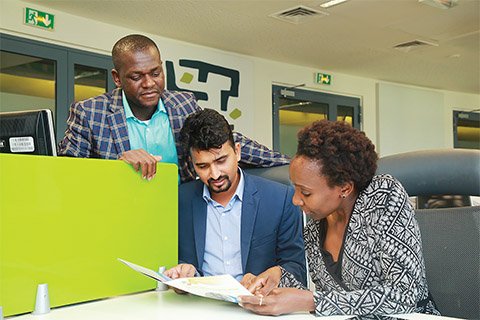Empowering Africa

CSE alumna makes energy affordable and viable
December 6, 2019
For most of us, electricity is the backbone of our lives, powering virtually every moment of every day. But in Africa, electricity is anything but a given.
In fact, more than 600 million Africans have no access to electricity—an access rate of just over 40 percent, the lowest in the world. And in sub-Saharan countries like Tanzania, access is particularly low, especially in rural areas.
It’s a challenge that Stella Mandago (Electrical Engineering ’05, M.S. ’07), the first Tanzanian to earn an electrical engineering degree from the University of Minnesota, is addressing head on.
Since 2012, she’s been working as an energy advisor for African Development Bank. Its mission is to help African countries attain sustainable economic development and social progress through policy reform and investments. One of its key programs, Light Up and Power Africa, seeks to help the continent achieve universal access to electricity by 2025.
Power trading between countries
There are numerous options for electric power in Africa, including geothermal power plants, solar mini grids, and conventional low-voltage grid extensions. But making electricity affordable and viable requires many factors to come together, including low-cost ways to meet demands and the infrastructure to bring it to life. It also requires billions of dollars in funding and experts to guide the way.
Mandago, who grew up in a village without electricity, helps sub-Saharan countries develop sound energy policies and find investors, grants, and technical expertise that align with government needs. She also facilitates regional interconnection—power trading between countries.
In a current electrification project with Rwanda, the government receives investment funding when certain targets are achieved.
“We started by helping the government review its policies and systems on providing electricity,” said Mandago.
She and her team are now working with stakeholders to ensure that targets are met and funds are dispersed. Recent projects in Tanzania include electrification of small businesses in rural areas, including gas stations, banks, and restaurants—all of which help create jobs.
Passion for her work and continent
Mandago’s career path began to take shape in secondary school in Shinyanga, when a teacher noted her mathematical abilities and encouraged her to pursue electrical engineering. Mandago learned about the University of Minnesota at the U.S. Embassy in Dar es Salaam, applied, and was readily accepted.
During her sophomore year, one of her professors—Paul Imbertson—also urged her to study electrical engineering.
“I took it from there,” she said.
“The U is the best thing that’s happened to me,” Mandago said.
Mandago’s ties to her alma mater continue.
She’s currently in conversation with Modou Jaw, a fellow African and electrical engineering (EE ’19) graduate, to improve educational opportunities in the continent. Plus, she’s partnering with Douglas Ernie, an associate professor in electrical engineering, to offer online lectures through Unite the World with Africa Foundation, Inc.
Every step of the way, Mandago is fueled by a passion for her country and profession.
“I like using my skills to support Africa’s needs,” she said. “Especially after seeing the difference electrification projects make.”
Written by Jodi Auvin
Read about CSE alumnus Michael Overcash's work with mapping industrial chemicals in "Mapping the Other Genome."
Read about CSE alumnus Collin Smith's job as a natural-area restoration designer in "Designing Greener Spaces."
